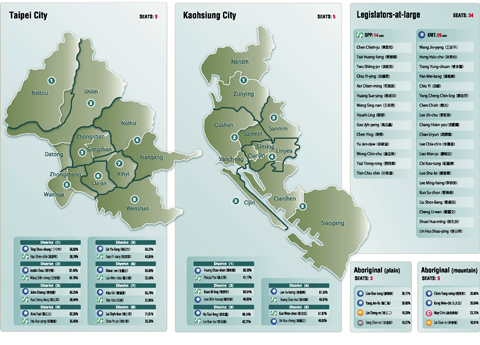Unofficial observers from overseas praised the calm atmosphere and efficiency of yesterday's elections, although some commented on the low turnout rate among younger voters.
Member of the European Parliament for Hamburg Georg Jarzembowski, who came to Taiwan to observe the election, said the smooth way in which the voting process proceeded was an indication of the maturity of the nation's democracy.
"We did not notice anything out of the ordinary. Everything went as the polls have suggested," Jarzembowski said.

The election results signify that voters are dissatisfied with the incumbent government and are yearning for a fresh beginning to revive the economy, he said.
Jarzembowski, who heads the European Parliament's Taiwan Friendship Group, said he did not observe any misconduct at any of the polling stations he surveyed yesterday.
"The voters behaved just as we expected, orderly and enthusiastic," he said.
Jarzembowski said he was happy to see the candidates -- both winners and losers -- behave in a gracious manner.
Sebastian Dreyer, Taiwan Friendship Group secretary-general said the candidates had probably been on their best behavior because they knew their conduct in this election could influence the result of the presidential election in March.
Christopher Hughes, a professor of international relations at the London School of Economics, said the calmness of yesterday's elections was a "good thing, because in the past elections have been too emotional."
Hughes attended several election rallies and said groups of party supporters were relatively calm, even when rallies of opposing parties took place next to each other.
Gudrun Wacker, head of the Research Unit Asia from the German Institute for International and Security Affairs, said candidates' campaign platforms, especially in southern counties, were mostly localized and had concentrated on developing the region's economy.
Some graduate students from Johns Hopkins University's School of Advanced International Studies (SAIS) said there was a very low turnout among younger voters.
They said some students might have found it difficult to travel all the way home to vote.
One student, Christina Lin, said she was concerned to see a lack of involvement among young voters.
"Some of the students that I talked to did not plan to vote," SAIS student Andrew Publicover said.
The SAIS students said they were able to attend various election events and talk to candidates about their policies.
They said the trip helped them gain a better understanding of Taiwan's political climate, especially on the issue of national identity, cross-strait relations and the role of the US in China-Taiwan relations.

An essay competition jointly organized by a local writing society and a publisher affiliated with the Chinese Communist Party (CCP) might have contravened the Act Governing Relations Between the People of the Taiwan Area and the Mainland Area (臺灣地區與大陸地區人民關係條例), the Mainland Affairs Council (MAC) said on Thursday. “In this case, the partner organization is clearly an agency under the CCP’s Fujian Provincial Committee,” MAC Deputy Minister and spokesperson Liang Wen-chieh (梁文傑) said at a news briefing in Taipei. “It also involves bringing Taiwanese students to China with all-expenses-paid arrangements to attend award ceremonies and camps,” Liang said. Those two “characteristics” are typically sufficient

A magnitude 5.9 earthquake that struck about 33km off the coast of Hualien City was the "main shock" in a series of quakes in the area, with aftershocks expected over the next three days, the Central Weather Administration (CWA) said yesterday. Prior to the magnitude 5.9 quake shaking most of Taiwan at 6:53pm yesterday, six other earthquakes stronger than a magnitude of 4, starting with a magnitude 5.5 quake at 6:09pm, occurred in the area. CWA Seismological Center Director Wu Chien-fu (吳健富) confirmed that the quakes were all part of the same series and that the magnitude 5.5 temblor was

The brilliant blue waters, thick foliage and bucolic atmosphere on this seemingly idyllic archipelago deep in the Pacific Ocean belie the key role it now plays in a titanic geopolitical struggle. Palau is again on the front line as China, and the US and its allies prepare their forces in an intensifying contest for control over the Asia-Pacific region. The democratic nation of just 17,000 people hosts US-controlled airstrips and soon-to-be-completed radar installations that the US military describes as “critical” to monitoring vast swathes of water and airspace. It is also a key piece of the second island chain, a string of

The Central Weather Administration has issued a heat alert for southeastern Taiwan, warning of temperatures as high as 36°C today, while alerting some coastal areas of strong winds later in the day. Kaohsiung’s Neimen District (內門) and Pingtung County’s Neipu Township (內埔) are under an orange heat alert, which warns of temperatures as high as 36°C for three consecutive days, the CWA said, citing southwest winds. The heat would also extend to Tainan’s Nansi (楠西) and Yujing (玉井) districts, as well as Pingtung’s Gaoshu (高樹), Yanpu (鹽埔) and Majia (瑪家) townships, it said, forecasting highs of up to 36°C in those areas